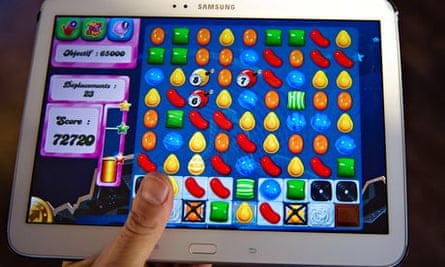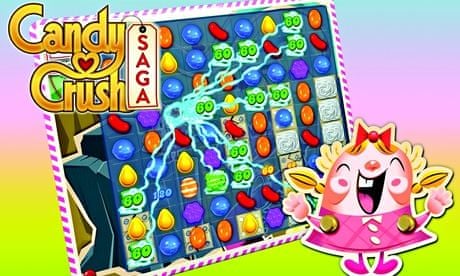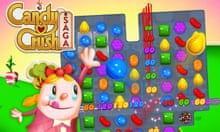Sebastian Knutsson doesn't even like candy. Which is kind of sweet given that he is responsible for developing Candy Crush Saga, the computer game that has become a global phenomenon.
"I like chocolate," he says after due consideration, "but not necessarily candy."
Knutsson, the Swedish creative director of gaming company King Digital Entertainment, has been the driving force behind the success of Candy Crush. The game is deceptively simple: a player must match three or more brightly coloured hard-boiled sweets in order to win points and progress to the next level. It's a bit like Tetris, but easier and with fewer hard edges. The sweets seemed like a good idea at the time. Knutsson, 45, says he liked the bold, brash colours of jelly beans, sherbet lemons and barley sugars because they reminded him of the early 1990s arcade games he grew up with.
"I'm not the PlayStation generation that expects everything to be in 3D," he says. "I enjoyed Tetris and pinball machines: the games where you got stuck and you'd give it another go for 25p to try again."
Candy Crush came about because he wanted to recreate that sense of straightforward pleasure. But no one could have foreseen its impact. "No," says Knutsson. "We were surprised."
Within a year of its release for Facebook in 2012, Candy Crush had become the social networking site's most popular game, with 46 million average monthly users. Now it has been downloaded to more than 500 million mobile devices worldwide and 97 million of us play it every day. It was the most downloaded free app of 2013 and the optional paid-for extras (which help players move forward) generate $850,000 (more than £500,000) in daily sales.
As a result, Candy Crush is now responsible for nearly three-quarters of King's revenue and analysts estimate that the company's annual turnover is around £300m. Despite concern at King's over-reliance on the game, it went public in March, valued at $6bn with shares priced at $22.50. After dipping below $17, they are now trading at more than $18.
Not bad for a pile of animated sweets. Candy Crush's genius – and the reason it has shown staying power in a notoriously fickle market (remember Farmville anyone?) – is that it is multi-platform: it can be played on social networks, on smartphones, tablets or home computers. A game can be picked up and continued whenever a player has a few minutes to spare – on the commute, in a lunch break, during a boring meeting or just before sleeping, in place of pillow talk. It is also social. A big part of the appeal is being able to compare your score with friends online.

Whereas the popular stereotype of a computer gamer used to be a solitary teenage Goth hunched over a console playing World of Warcraft in a darkened room, Candy Crush has capitalised on an emerging female friendly market that uses hand-held electronic devices to play and to engage with other players.
Natalie Meehan, 26, a freelance writer from Brighton, is a fan despite readily admitting that she is "not your standard gamer" (the entirety of her previous gaming-related experience was owning a Tamagotchi).
"I only downloaded Candy Crush because I'd finished the book I was reading on my Kindle and I had a long train journey to tolerate," Meehan says. "Everyone had been banging on about it, so I thought 'sod it'. I soon became hooked. It's crazily addictive! I have a reasonably short commute – less than 20 minutes on the train to and from the office – and I tend to play it both there and back every day."
Intriguingly, she says that playing increases her concentration levels. "I always listen to podcasts on the journey and I find that if I'm listening to, say, The Food Programme while walking to the station, my mind wanders and I end up missing parts of the broadcast because I'm thinking about what I'll have for breakfast, or what I'll write about that day. As soon as I get on the train and start playing the game, my attention focuses and I'm able to listen to the podcast properly."
Meehan is not alone. There was a time, about three months ago, that Candy Crush seemed to reach critical mass. Everywhere you looked – buses, park benches, cafes – people were obsessively jabbing their fingers at a screen of luminescent lozenges. A friend of mine started playing on her maternity leave in between feeds and nappy changes and reached level 500, which was then the highest (these days, King has a team working full time on developing new levels as fast as possible to keep pace with demand).
Knutsson has reached only level 459. He says he realised Candy Crush had become special when he was travelling for business and flight attendants and customs officials started telling him they played it. Although King's core demographic is women aged 25-45, there appears to be no end to the game's appeal. Recently, he was in the back of a taxi, doing a phone interview, and the cab driver – "who was sixtysomething, grey-haired" – showed Knutsson his own smartphone with the Candy Crush game frozen on screen. "It's hard to know when people will tire of it," Knutsson says.
Or, indeed, if they will. The superficial simplicity of Candy Crush belies an extremely sophisticated design process. Riccardo Zacconi, King's CEO and co-founder, has a rule that new games must be built in no more than three months by no more than three people. They are tried out first on King.com. With enough hits, the game will then mutate on to Facebook. If the game proves successful there, only then will it be made available on tablet or smartphone. It's an effective system that keeps costs low.
And then there are the game mechanics: the canny ways in which King keeps people hooked. Candy Crush is easy to pick up but just stimulating enough to ensure a player feels they are improving. A player is never stuck for too long: if you fail to make a move within 10 seconds, Candy Crush will offer you a hint. This motivates gamers to keep on playing, especially if they are comparing their progress with that of their friends. The first 35 levels are free; after that, 69p buys you 20 new levels.
"We're helping the players a lot and easing them into playing," says Caroline Krenzer, 29, the lead producer on King's new game, Farm Heroes Saga. "There's usually a tutorial which very quickly explains the main game element. We make sure you don't want to waste time trying to understand it."
But the stroke of genius is the fixed interval. Candy Crush gives users five lives – and when you lose one, it takes 25 minutes to get it back unless you buy extra lives through the app.
"Once you accomplish one level, you want to immediately try to push yourself to see just how far you can go," says avid player Tim Nthambi, 31, an e-learning technician at Manchester Academy.

Some psychologists claim that, although Candy Crush is a so-called freemium game (which means it is free to play but other products are sold to users at a premium rate), it can lead to serious gambling problems. Concern over the spiralling cost of purchases via the app has prompted the Office of Fair Trading to investigate. According to research conducted by Ask Your Target Market, 67% of Candy Crush players say the game has had an impact on their lives, 32% say they ignore friends and family, while 10% have argued over the time they spend playing.
Professor Mark Griffiths, head of the International Gaming Research Institute at Nottingham Trent University, has said that games such as Candy Crush "introduce players to the principles and excitement of gambling. Small, unpredictable rewards lead to highly engaged, repetitive behaviour. In a minority, this may lead to addiction."
For casual players like Tim Nthambi or Natalie Meehan, however, the repetitive behaviour is part of the fun.
The offices of King Digital Entertainment in London do not look like the headquarters of a money-grabbing global gaming corporation exploiting addiction for profit.
Set on the 10th floor of a trendy office building off Tottenham Court Road, its panoramic windows show an impressive sweep of the city. There are bowls of sweets and free KitKats in the meeting rooms. A computer tablet in reception allows you to try your hand at King products.
"This is an office where employees are actually encouraged to play games," says Krenzer, "because we're testing them before we get them out to the players."
As I am shown around, I spy at least one room containing a table football game and another piled high with mattresses and beanbags where some of King's 665 employees presumably brainstorm. We stop at a shelving unit filled with what looks like the remains of a child's dressing-up box – cowboy hats, feather boas and comedy glasses. "That was from a party we had the other night," says the PR manager.
Today, there is an air of quiet industry. The desks are occupied by super-bright creative types of varying nationalities sporting facial hair and ironic T-shirts. Everyone is hard at work developing King's next game: Candy Crush Mark II, otherwise known as Farm Heroes Saga.
Acting on the principle that if something isn't broken, there could be no conceivable need to fix it, Farm Heroes operates along exactly the same lines as Candy Crush. It features cutesy animals instead of hard-boiled sweets.
But again, in spite of the superficial simplicity, the attention to detail is astonishing. A considerable amount of work goes into ensuring the game looks exactly right: friendly, fun and accessible to a predominantly non-gaming audience.
"It's like if you see a picture on Facebook of a cute cat," says Sean Hayden, a senior games artist. "It's aiming for that same aesthetic."
Everyone is encouraged to pitch in. An online forum is open for anyone in the company to comment as the game is evolving. Every so often, there will be an awayday "game jam" where people are encouraged to come up with ideas.

As a result, the Farm Heroes characters have a distinct and minutely thought-through appearance. The baddie – a fox swathed in purple – is drawn with no shoulders in order to accentuate his "evil, weedy" appearance. The plucky piglet is called Amelia, after the pilot Amelia Earhart, and comes complete with a neckerchief and goggles.
"We wanted to make it look like she was the smart one, the one who could fix things," says digital artist Gabriel Loques. "Our player base is mostly women and we design games for people who didn't play games before so we never have anything too dark or too sad."
The pressure is on to make Farm Heroes a success. A wave of television advertising is set to whip up interest. When King started advertising Candy Crush on Japanese TV in 2013, the game jumped from being outside the top-100 most downloaded iPhone games in the country to the number one slot in under a week.
King is wary of the accusation that Candy Crush could only ever be a one-hit wonder but online gaming companies have traditionally struggled to stay the course. Zynga, the creator of Farmville (Facebook's most popular app until it was ousted by Candy Crush) went public in 2011 with a $7bn valuation, or $10 per share. Today it trades at around $5.80 per share – a decline of more than 40% from its stock market debut and Farmville, once a viral sensation, is now seen as embarrassingly passé.
Traditionally, hit games have a short shelf-life and can be passing fads (Angry Birds, Bejewelled and Guitar Hero do not have the market presence they once did). Success is also highly unpredictable: King, for instance, had been making games for a decade before it hit upon Candy Crush.
For now, though, there is no doubt that Candy Crush has captured the public imagination and will continue to do so for the foreseeable future. Play it once and you'll want to play it again. And like all the best games, it has an element of obsessiveness to it.
"I match things everywhere," says Krenzer. "Sometimes, I even dream about it too."
It already dominates our every waking hour. It can't be much longer until Candy Crush Saga creeps into our subconscious lives too.







Comments (…)
Sign in or create your Guardian account to join the discussion